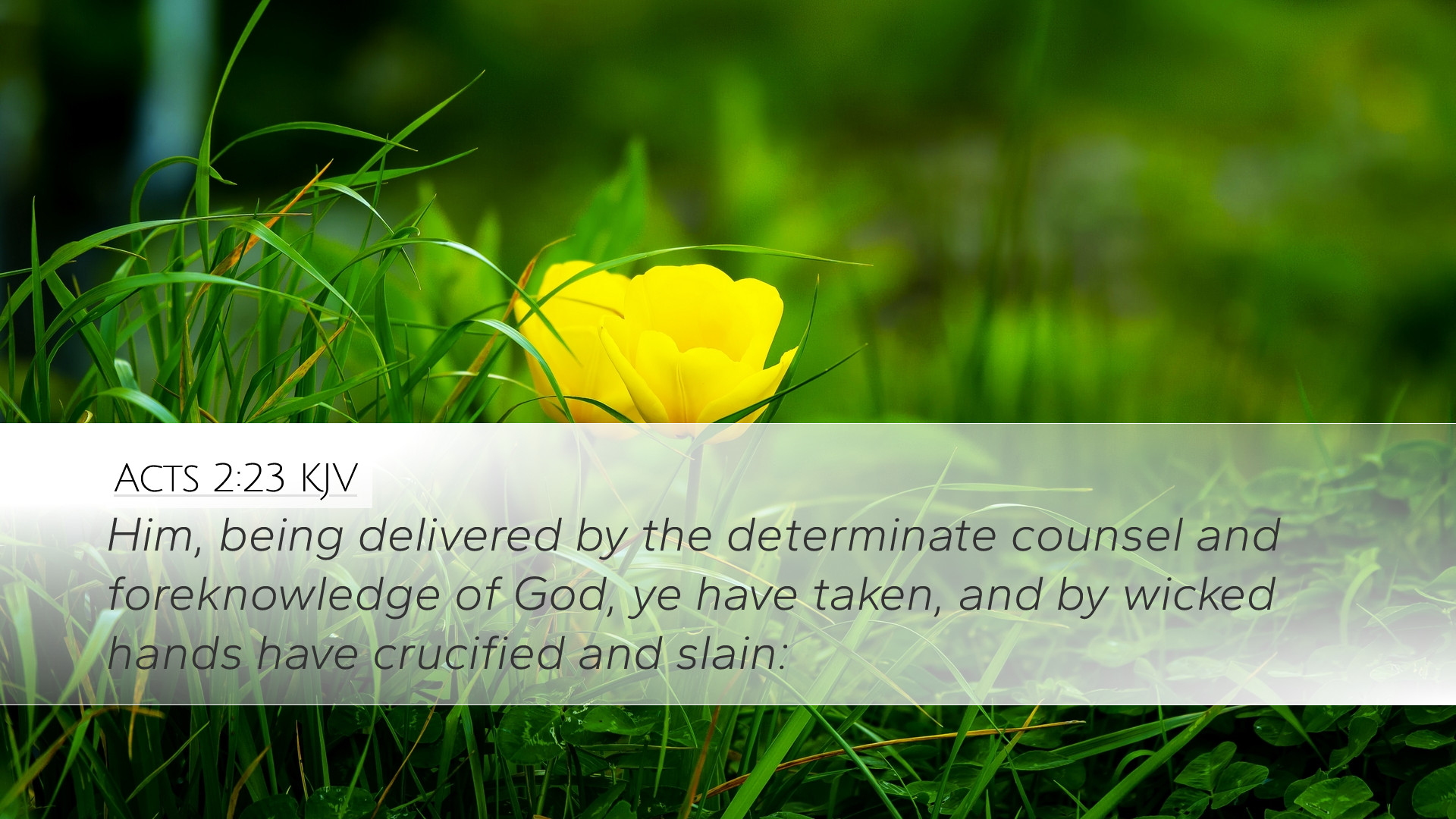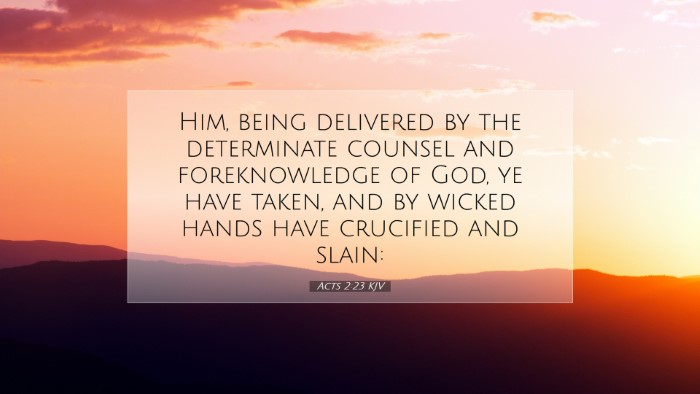Commentary on Acts 2:23
Verse: Acts 2:23 - "This man was handed over to you by God’s deliberate plan and foreknowledge; and you, with the help of wicked men, put him to death by nailing him to the cross."
Introduction
Acts 2:23 stands as a pivotal verse within Peter’s sermon at Pentecost, revealing profound truths regarding God’s sovereignty, the nature of human responsibility, and the unfolding plan of salvation through Christ. This commentary synthesizes insights from several public domain sources, including Matthew Henry, Albert Barnes, and Adam Clarke, providing in-depth reflections for pastors, students, theologians, and Bible scholars.
Contextual Background
Acts serves as a historical account of the early Church, emphasizing the work of the Holy Spirit and the apostolic mission. This verse occurs immediately after the outpouring of the Spirit and the miraculous speaking in tongues, in which Peter addresses the crowd, connecting the events of Pentecost with the prophecy of Joel (Acts 2:17-21). The context sets the stage for a powerful exposition of Jesus’ life, crucifixion, and resurrection.
Divine Sovereignty and Foreknowledge
Matthew Henry notes that the phrase "by God’s deliberate plan and foreknowledge" highlights the divine orchestration of events leading to the crucifixion. This was not a mere chance occurrence but a part of God’s eternal plan. The term "foreknowledge" indicates God's prior knowledge of events, suggesting that the crucifixion was intended as a necessary step in the redemptive story.
-
Henry emphasizes the importance of divine providence, asserting that God's purpose remains unthwarted despite human actions.
-
This aligns with Romans 8:28, wherein Paul reassures believers that God works all things for good for those who love Him.
Human Responsibility
Albert Barnes elaborates on the implication of "you, with the help of wicked men, put him to death", underscoring the accountability of those who crucified Jesus. While God orchestrated the events, it did not absolve humans of responsibility; rather, it emphasizes the interplay between divine sovereignty and human free will.
-
Barnes suggests that Peter's address serves to convict the audience of their role in the crucifixion, evoking a sense of guilt that leads to repentance (Acts 2:37).
-
This aspect of responsibility raises questions concerning culpability, where human actions directly align with divine prophecy.
The Role of Wicked Men
Adam Clarke provides insights regarding the term "wicked men", identifying them as those who facilitated Jesus's crucifixion, including both Jewish leaders and Roman authorities. Clarke emphasizes that this label serves a dual purpose:
-
It describes their moral character in contrast to Jesus' perfect righteousness.
-
It signifies their alignment with God’s profound plan, despite their malicious intent.
The Cross and Its Implications
The act of crucifixion itself serves as a central theme in Christian theology. The mention of "nailing him to the cross" encapsulates the deep humiliation and suffering that Christ endured. This aligns with the prophetic utterances found in Psalms and Isaiah, where suffering and sacrifice become key components of the messianic narrative.
-
Matthew Henry asserts that the cross exemplifies both the depths of human sinfulness and the heights of divine love, acting as a fulcrum for the gospel's power.
-
The crucifixion is not merely a historical event but a theological assertion that through weakness and suffering, ultimate victory over sin and death is achieved.
Theological Reflections
Analyzing Acts 2:23 leads theologians to ponder several critical doctrines:
-
Predestination and Free Will: The interplay of God’s foreknowledge and human choices evokes discussions around predestination, highlighting how God works through human history to accomplish his purposes without negating human agency.
-
Atonement: The necessity of the cross for atoning for sin becomes manifest, aligning with Hebrews 9:22, which states that without the shedding of blood, there is no forgiveness.
-
Christology: This verse affirms a central truth of Christology—the duality of Christ as both divine and human, whose death was essential for the redemption of humanity.
Conclusion
Acts 2:23 profoundly encapsulates the central themes of Christian faith: God’s sovereignty, human responsibility, and the redemptive power of the cross. Insights from esteemed commentators such as Matthew Henry, Albert Barnes, and Adam Clarke serve to enrich our understanding of this verse's implications for theology and faith practice. For the pastor, the educator, and the scholar, this passage is a springboard for examining the nature of God’s plan and the transformative message of Christ’s sacrifice.


